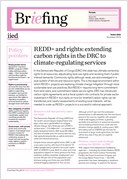REDD+ and rights: extending carbon rights in the DRC to climate-regulating services (IIED)
International Institute for Environment and Development / November 2013
 This briefing looks at the importance of clarifying carbon rights in REDD+ projects in the Democratic Republic of Congo. With the world’s second largest tropical forest effectively controlling deforestation in the DRC will be crucial to reducing emissions of greenhouse gases.
This briefing looks at the importance of clarifying carbon rights in REDD+ projects in the Democratic Republic of Congo. With the world’s second largest tropical forest effectively controlling deforestation in the DRC will be crucial to reducing emissions of greenhouse gases.
The briefing concludes that to increase private sector participation there is an urgent need to define carbon rights for REDD+ (Reducing Emissions from Deforestation and Forest Degradation) in terms of “their ownership and how they might be transferred and taxed”.
It also says existing rights to food and fuel (known as provisioning services) are firmly enshrined but less defined when it comes to a forest capturing carbon dioxide (regulatory ecosystem services).
Another key conclusion is that the government – with participation from the private sector and communities – should design REDD+ programmes that tackle the drivers of deforestation and factor in the benefits of the right to carbon (and how this is shared).
Selected quotes from the report
Security of land, forests and carbon rights is important for any long-term investment (especially in climate change mitigation) and for sustainable resource use and management. Government agencies, NGOs and private sector companies are testing REDD+ across the DRC’s various forest landscapes, and in this context, it is important to address the insecurity of rights that can further drive deforestation and forest degradation. A legal instrument (policy, law/regulation/decree) is needed to specify whether and how carbon rights can be acquired or indeed transferred.
REDD+ projects in DRC are already exploring these issues of rights and access through existing forest legislation, conservation concessions and social agreements, and this exploration is part of essential learning about how REDD+ works on the ground. For this learning to be scaled up to sub-national and national levels, the government, with support from the private sector (voluntary and for-profit) and communities, must design more inclusive models for REDD+ initiatives that include local communities in addressing the rivers and underlying causes of forest degradation, and in establishing the rights to REDD+ benefits.
————————————
This summary was prepared by Why Green Economy?. The views expressed have been paraphrased. See the original source for more information.

Leave a Reply